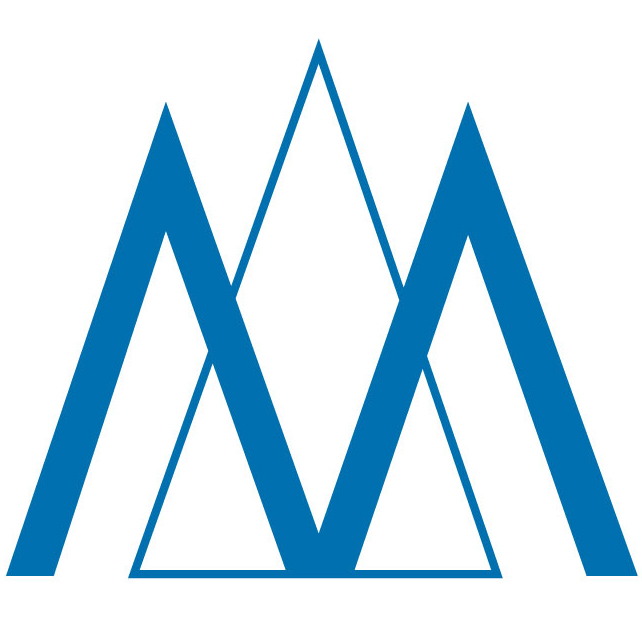
Branding Guidelines
Using AOM’s Brand
The Academy of Management represents more than a professional association: it represents a bridge to the future of management and organization research. All AOM members, volunteers and staff have an obligation to represent the Academy’s brand through face-to-face and online communications. By presenting professional, consistent messages and a unified look, AOM’s reputation, name recognition and brand become stronger.
As representatives of the brand, AOM members and staff are disciplined in the way the organization is presented. While creativity in bringing the AOM brand to life is encouraged, it is important to do so within these guidelines. Adhering to these guidelines helps strengthen our brand and support our identity and the mission and values we represent.
The Communications and Marketing Team can assist with converting to these guidelines, whether it’s designing a customized Division or Interest Group (DIG) logo, reviewing and formatting documents, or helping to install the right typeface on your computer. It should be noted that this is a “living” document. As new media and uses come to the fore, these recommendations are sure to evolve to accommodate them.
Logos
The AOM logo is one of the most recognizable and visible aspects of the Academy of Management. People are introduced to AOM through its presentation.
The current logo includes the logomark (logo) combined with the logotype “Academy of Management”.

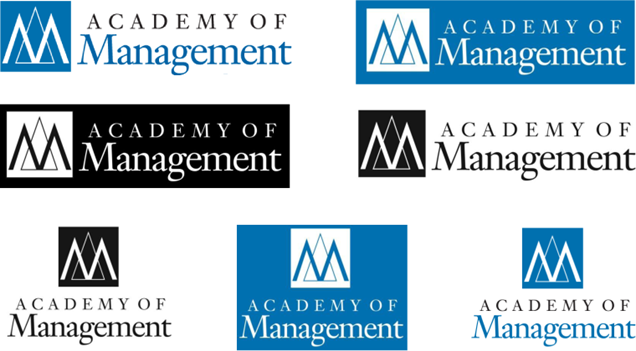
The logotype font is Janson Text.
The logo colors are blue, white, and black. For printing purposes, the blue is Pantone Solid Coated 7683 C or Pantone Solid Uncoated 7691 U. For digital purposes, the blue is hex value is #0070AF.
The Academy logo is available in two arrangements: vertical and horizontal. Use only approved logo files provided by AOM and available here.
Logo Placement
The logo needs to be clear and readable. To maintain full legibility, the size of the logo should be at least ¼ of an inch tall (30 pixels for digital) and the words “Academy of” easily readable.
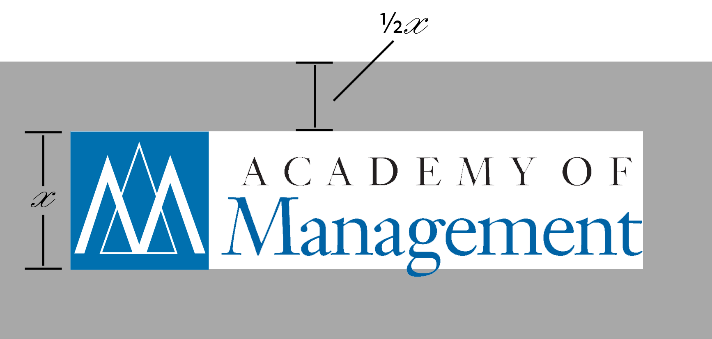
To maximize impact and ensure readability, a protected area around the logo should be maintained. The protected area is equal to half the height of the logo and extends out on all four sides of the logo.
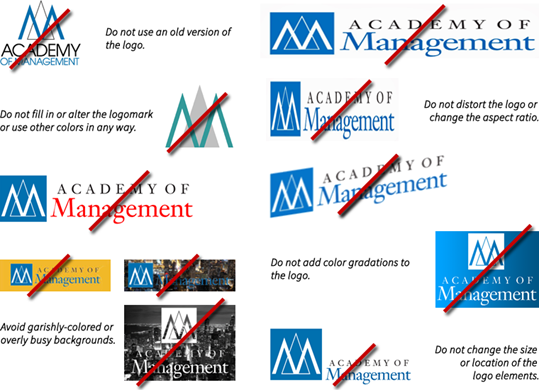
While the logo doesn’t always need to be the most dominant element on the page, it is important to place the logo on a background that allows it to be easily seen. Try not use the logo on a busy, dark or vibrantly colored background. If using a dark background, use the white Academy logo.
Logo use and placements to avoid:
- Using old logos
- Creating your own version of the logo
- Stretching or skewing the logo’s perspective
- Placing the logo too close to other graphical elements
- Adding additional type inside the clear space
- Placing the logo on top of busy photographs that reduces visibility and legibility
Trademark
The Academy of Management logo and all Academy of Management properties are trademarked. Misuse or copying of the logo or marks by third parties is prohibited.
Typeface/Font
The Academy of Management strives for consistent font usage in all our communications – internal and external.
AOM’s official fonts are Source Sans Pro (sans serif) and Janson SK Pro (serif). Both fonts are available for download here.
Source Sans Pro can be used as a main font for large headlines and bold messages, as well as small to medium sized copy.
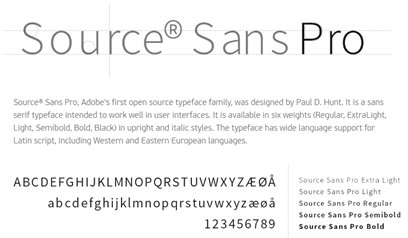
JansenSK Pro can be used for large blocks of copy and for more stylish typography when serifs are preferred.
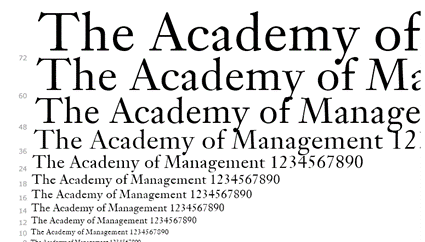

Graphic and Design Elements
Graphics
Infographics are an easy way to convey complex ideas and data in a quick, visual communication. They combine facts, charts and data points that highlight the research our authors and scholars conduct.
Photography

The Academy of Management uses a combination of event and stock photography for our communications. Our event photographs capture the emotion of our members at our Annual Meeting and Specialized Conferences. Our stock photography selections incorporate images that quickly and easily convey a situation or emotion. These images often accompany Insights summaries where an image or graphic immediately expresses the main idea.
PowerPoint and Zoom Templates
AOM provides a PowerPoint template and Zoom image that may be used as a background or accent piece when necessary.
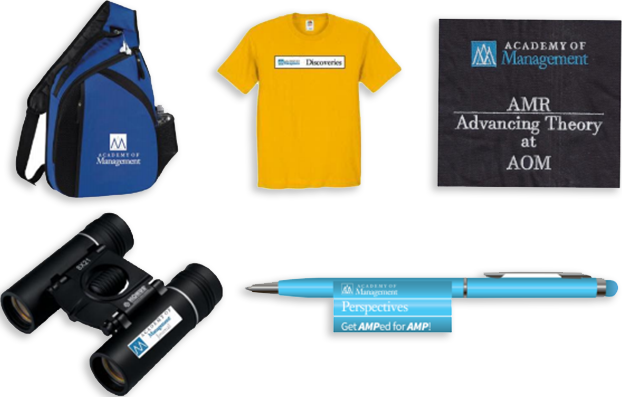
Signage, Collateral and Swag
The Academy of Management’s brand is often most present and visible in signage and collateral. In these cases, it is important that the AOM’s name or logo be included and presented in a clear and visible manner.
Whenever producing signage or collateral, please contact the AOM Marketing Team for assistance with logo layout and placement, as well as production assistance with the vendor.
Colors and Accents
Primary Color
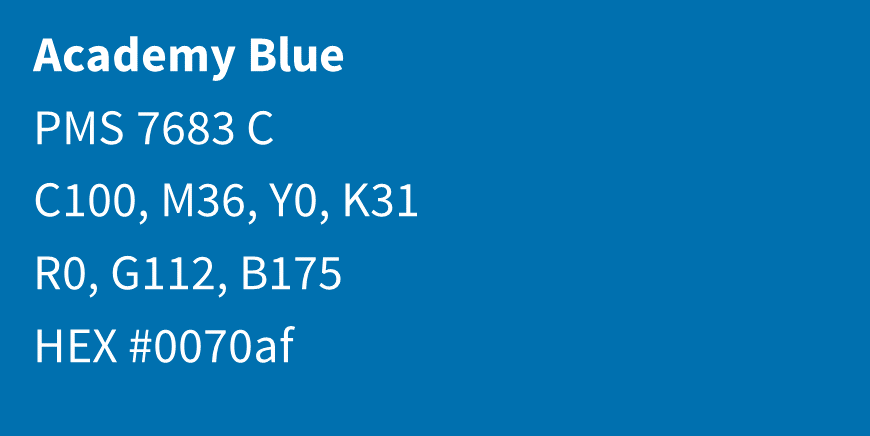
Accent Colors
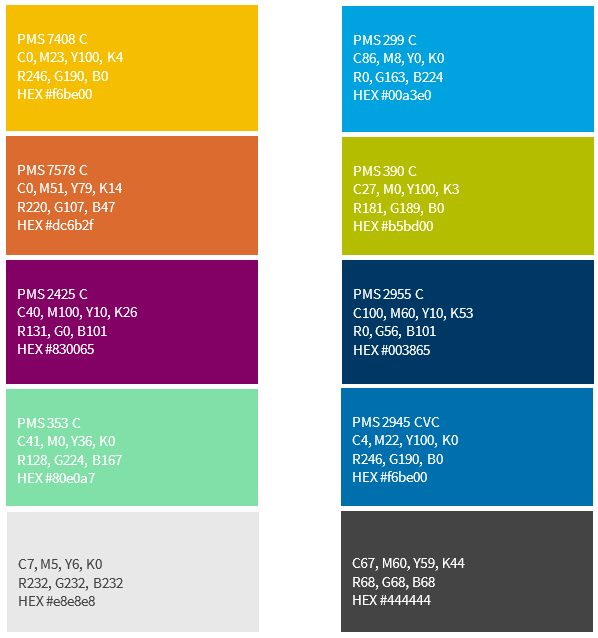
Journal Colors
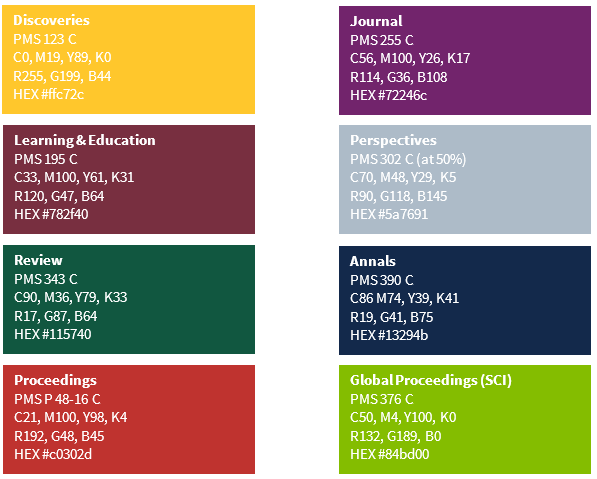
In addition to this guide, AOM relies on The Chicago Manual of Style as our guide of reference and Merriam-Webster as our spelling and punctuation guide.
The Academy of Management Name
As we work to strengthen the Academy of Management brand, we must concentrate on how we refer to ourselves and the Academy. Upon first reference in body copy, always use the full name “Academy of Management (AOM).” Subsequent references should be limited to AOM.
- Academy of Management and AOM are the only names that should be used.
- Do not use “the Academy,” “A of M,” “AoM” or any other abbreviation such as “Acad. of Mgmt.” or other variations on the name.
- When using AOM, “the” should not be used before AOM.
- Use AOM as a first reference preface. Example: AOM scholars, AOM members.
Members
All AOM members are equal in relation to their country or residence. Do not refer to members from another country as “international members”. Instead, refer to a member from another country as “member(s) from [country/region]”.
- Use “Academy of Management members” or “AOM members” when referring to AOM members as a whole. Use “members” for subsequent references.
- When referring to a subset of AOM members, such as editors, divisions, follow the same rule as above: Academy of Management [subset group] on first reference and AOM [subset group] on subsequent references.
- AOM Career Division member or AOM Member of the ENT Division
- Volunteers are AOM members who are doing volunteer work with AOM in an editorial or governance capacity.
- AOM Scholars for marketing purposes are members who have published in an AOM journal or presented at an AOM event.
Abbreviations and Acronyms
In general, avoid “alphabet soup” – the unnecessary use of acronyms or abbreviations that creates a sense of insider communications and may exclude or confuse non-members and those who are not familiar with AOM’s acronyms. For outsiders who don’t know AOM, they don’t know what DSDP, MED, DIGs or SCI stand for. Using these exclusively creates confusion among readers who are not as familiar with our inner workings as we are.
When necessary, spell out the first reference followed by the acronym or abbreviation in parentheses: Academy of Management (AOM). Subsequent references can use the acronym alone: AOM.
Divisions and Interest Groups (DIGs)
First Reference
- Careers (Second Reference: CAR)
- Communication, Digital Technology, and Organization (Second Reference: CTO)
- Conflict Management (Second Reference: CM)
- Critical Management Studies (Second Reference: CMS)
- Entrepreneurship (Second Reference: ENT)
- Gender and Diversity in Organizations (Second Reference: GDO)
- Health Care Management (Second Reference: HCM)
- Human Resources (Second Reference: HR)
- International Management (Second Reference: IM)
- Management Consulting (Second Reference: MC)
- Management Education and Development (Second Reference: MED)
- Management History (Second Reference: MH)
- Management Spirituality and Religion (Second Reference: MSR)
- Managerial and Organizational Cognition (Second Reference: MOC)
- Organizational Neuroscience (Second Reference: NEU)
- Operations and Supply Chain Management (Second Reference: OSCM)
- Organization and Management Theory (Second Reference: OMT)
- Organization Development and Change (Second Reference: ODC)
- Organizational Behavior (Second Reference: OB)
- Organizations and the Natural Environment (Second Reference: ONE)
- Public and Nonprofit (Second Reference: PNP)
- Research Methods (Second Reference: RM)
- Social Issues in Management (Second Reference: SIM)
- Strategic Management (Second Reference: STR)
- Technology and Innovation Management (Second Reference: TIM)
Academy of Management Journals
AOM journal titles should always be in italics when the full name of the journal is written out. Journal acronyms are not italicized. “The” should not be placed before a journal title. Ex: Academy of Management Annals, NOT “The Academy of Management Annals” or “The Annals.”
First Reference
- Academy of Management Annals (Second Reference: Annals)
- Academy of Management Collections (Second reference: Collections)
- Academy of Management Discoveries (Second reference: AMD)
- Academy of Management Global Proceedings (Second reference: Global Proceedings)
- Academy of Management Insights (Second reference: Insights)
- Academy of Management Journal (Second reference: AMJ)
- Academy of Management Learning & Education (Second reference: AMLE)
- Academy of Management Perspectives (Second reference: AMP)
- Academy of Management Proceedings (Second reference: Proceedings)
- Academy of Management Review (Second reference: AMR)
Academic Degrees

Capitalization (See also Titles)
Capitalize a job title when it immediately precedes a person’s name. The title is not capitalized when it is incomplete, follows a name or is on second reference:
- Academy of Management President [Name]
- [Name], president of the Academy of Management
- Professor [Name], Associate Professor [Name]
- the president
- the 80th Annual Meeting of the Academy of Management
AOM Member Types
Lowercase member when referring to a member in general and capitalize when referring to the membership type itself. Examples:
- Joe is an AOM student member….
- Joe registered as a Student Member to attend the Annual Meeting…
- Academic Member
- Emeritus Member
- Executive Member
- Student Member
- AOM Scholar (for PR purposes)
City and Country References
Depending on global awareness of specific cities or countries, it is not necessary to indicate the city, state/province, and country at all times. See Cities and States from Princeton and AP Style Datelines as references.
When referencing locations for AOM events or member locations, list the city and country for locations outside the United States and city, state and USA for locations inside the United States.
- Bled, Slovenia
- Mexico City, Mexico
- Boston, Massachusetts, USA
Currency
When indicating a costs or fees, use the correct currency code and symbol. A list of global currency symbols is available at TransferWise.
- United States: $1 USD
- European Union: €1 EUR
- Great Britain: £1 GBP
- Mexico: $1 MXN
Dates and Times
AOM uses the international date and time format to represent dates and times.
- Day Month Year (DD MM YYYY) without any separating commas. Example: 31 December 2019
- 24-hour time (HH:MM) without any am or pm designation. Example: 17:00 instead of 5 pm
- Indicate the Coordinated Universal Time (formerly Greenwich Mean Time), displayed as UTC/GMT, to indicate global time zones. A time zone converter, such as World Time Buddy, can be used on the web to display the indicated time zone and the user’s local time zone.
- Eastern Standard Time (EST) is UTC-5/GMT-5
- Eastern Daylight Time (EDT) is UTC-4/GMT-4
- By default, use US Eastern time, the location of AOM headquarters. Example: Submissions are due on 1 January 2021 at 12:00 EST (UTC-5/GMT-5)
- When specifying a time in a specific location outside AOM HQ, indicate the local time and include the UTC/GMT time difference. Example: AOM 2025 begins at 09:00 (UTC+2/GMT+2) in Copenhagen, Denmark.
Numbers
Spell out numbers one through nine and general numbers in narrative text:
- There were seven people at the meeting.
- There were 36 members in the session.
- There are approximately 5,000 members.
- There are a thousand reasons.
When a number is the first word of a sentence, spell it out.
Punctuation
Commas
Use serial commas for three or more items in a series. Example: Meetings, Publications, and Membership met to discuss scheduling.
Periods and Colons
Use one space after periods and colons.
Quotes
Do not italicize direct quotes. Normal style in narrative writing is to use quotes, not italics. You may italicize words within a quote for added emphasis. Ex: “I can say with certainty that it was not me.”
Em and En Dashes
Em dashes (—) should be used where needed—not hyphens with spaces on either side. (Never add spaces around Em dashes within a sentence.) (On a PC, type Alt, 0151)
En dashes (–) should be used for date ranges or time ranges. Again, no spaces around them.
Hyphenations
Do not hyphenate compound adjectives or nouns such as coworker, coauthor, coeditor. Most “co” words do not require a hyphen.
Taglines
The following are the official and approved taglines for AOM:
- Academy of Management Insights: Actionable evidence for the workplace
- AOM News: Improving management, scientifically
Telephone Numbers
Use country and area/city codes with hyphens for all telephone numbers. Alternatively, use “+1” to indicate the use of a preceding country code. If an extension is needed, follow the phone number with a comma, the “ext.” abbreviation and the extension. Do not use “.” periods or “/” slashes in phone numbers. Example: 011-914-326-1800, ext. 890 or +1-914-326-1800, ext. 890
Titles (see also Capitalization)
Only capitalize titles when linked to a specific person. Do not capitalize when referring to the person in general.
- AOM President Jacqueline A-M. Coyle-Shapiro attended the meeting.
- Jacqueline A-M. Coyle-Shapiro, President, Academy of Management, attended the meeting.
- The AOM president attended the meeting.
Do not use courtesy titles (Mr., Miss, Ms., Mrs.).
Use the title Dr. only when referring to a medical doctor.
Names followed by Jr., Sr. or a Roman numeral do not have a comma after the last name:
- Martin Luther King Jr.
- James Hart III
URLs
In text, use the shortest URL possible, such as aom.org/join or program.aom.org. For root-level sites, do not use “https://” or the “trailing slash”:
Example: aom.org, not https://www.aom.org/main/
In actual links, make sure to use https, not http, to ensure secure connections.
Example: https://www.aom.org, not http://www.aom.org
To request a shortened URL, redirect link, or custom AOM bitly URL, please submit a ZenDesk to Communications and Marketing.
Web and Online Terminology
Use the following terminology for web and online references, noting specific capitalization and punctuation uses.
- email (or Email at the beginning of a sentence)
- e-news, e-newsletter, e-book
- Facebook page
- homepage
- internet
- internet of things
- Sign in, sign out (verb) AOM preferred
- Login (noun): this is your login name
- Log in (verb): you need to log in first…
- online
- the web
- webpage
- Twitter feed
- YouTube
- website
Use and guidelines for Academy of Management sub-brands, such as AOM Insights and Specialized Conferences, should adhere to the same guidelines as the AOM logomark. The logo(s) should not be altered but should be incorporated within the design.
Affiliations
The Academy of Management grants license to groups to use the name and logomark of the Academy of Management in accordance with the affiliation and associated society guidelines established by the Board of Governors. The AOM actively polices its trademarks through examination of use of marks within registered countries. For information regarding licensing, please contact Support.
Annual Meeting
Each year, the Academy of Management develops a logo for the Annual Meeting. The Annual Meeting logo can be used by divisions, interest groups, committees, journals, and other formal groups for communication and marketing purposes associated to the Annual Meeting.
Vendors, exhibitors, sponsors and other third parties may request use of the Annual Meeting logo to promote their products or attendance, however use of the Academy of Management name and logomark alone is prohibited.
Committees
Academy of Management committees operate under the discretion of the Board of Governors and have limited autonomy. Committees are appointed by the Board to perform activities within their charge. As such, committee names are determined by AOM and referenced as “The XYZ Committee of the Academy of Management”. Committees do not have logos.
Divisions and Interest Groups
The Academy of Management’s 26 Divisions and Interest Groups (DIGs) provide disciplinary communities for members with specific scholarly and professional interests to share information and collaborate on projects.
Division and Interest Groups are encouraged to incorporate the AOM logo and name as part of their own. Division and Interest Group name should remain the primary focus for each logo and should be followed by “A Division [or Interest Group] of the Academy of Management” below their name.
New or revised logos must be submitted to the Division and Interest Group Relations Committee (DIGR) and Board of Governors for review and assessment.
For more information on AOM Divisions and Interest Groups (DIGs), please see our DIGs Page. For editorial usage, please see the Editorial Guidelines.
Academy of Management Insights
The Academy of Management created Insights as a content platform to bring the best academic research on management to business and society worldwide. Insights’ easy-to-read format transforms evidence-based research from the world’s best sources into actionable insights that improve the workplace.
For more information, visit Insights.
Academy of Management Journals
The Academy of Management journals are wholly a part of AOM, are the responsibility of the Board of Governors, and are trademarked around the world. Journals are registered as “Academy of Management [Journal Name]”. Many journals are also recognizable simply by the journal name: Discoveries, Learning and Education, which can be used in second references and by their abbreviations of the journal names (AMJ, AMR, etc.).
AOM journals share a consistent, recognizable and simple design. Each employs a primary color with the name “Academy of Management” in light grey, followed by the journal name in a left-justified white box and the AOM logo at the bottom left. Both the Academy’s wordmark and the title of the journal are in Janson Text font.
These covers are unique in the academic publishing space and readers will be assured that the contents will be of the high quality expected from the Academy of Management. For promotional purposes or when representing a journal in any way, the entire cover design should be used.
For a full list of AOM journals, please see our Editorial Guidelines.
